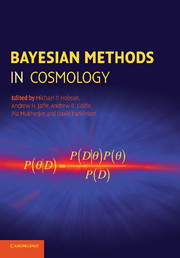Book contents
- Frontmatter
- Contents
- List of contributors
- Preface
- Part I Methods
- 1 Foundations and algorithms
- 2 Simple applications of Bayesian methods
- 3 Parameter estimation using Monte Carlo sampling
- 4 Model selection and multi-model inference
- 5 Bayesian experimental design and model selection forecasting
- 6 Signal separation in cosmology
- Part II Applications
- Index
5 - Bayesian experimental design and model selection forecasting
Published online by Cambridge University Press: 11 April 2011
- Frontmatter
- Contents
- List of contributors
- Preface
- Part I Methods
- 1 Foundations and algorithms
- 2 Simple applications of Bayesian methods
- 3 Parameter estimation using Monte Carlo sampling
- 4 Model selection and multi-model inference
- 5 Bayesian experimental design and model selection forecasting
- 6 Signal separation in cosmology
- Part II Applications
- Index
Summary
Introduction
Common applications of Bayesian methods in cosmology involve the computation of model probabilities and of posterior probability distributions for the parameters of those models. However, Bayesian statistics is not limited to applications based on existing data, but can equally well handle questions about expectations for the future performance of planned experiments, based on our current knowledge.
This is an important topic, especially with a number of future cosmology experiments and surveys currently being planned. To give a taste, they include: large-scale optical surveys such as Pan-STARRS (Panoramic Survey Telescope and Rapid Response System), DES (the Dark Energy Survey) and LSST (Large Synoptic Survey Telescope), massive spectroscopic surveys such as WFMOS (Wide-Field Fibrefed Multi-Object Spectrograph), satellite missions such as JDEM (the Joint Dark Energy Explorer) and EUCLID, continental-sized radio telescopes such as SKA (the Square Kilometer Array) and future cosmic microwave background experiments such as B-Pol searching for primordial gravitational waves. As the amount of available resources is limited, the question of how to optimize them in order to obtain the greatest possible science return, given present knowledge, will be of increasing importance.
In this chapter we address the issue of experimental forecasting and optimization, starting with the general aspects and a simple example. We then discuss the so-called Fisher Matrix approach, which allows one to compute forecasts rapidly, before looking at a real-world application. Finally, we cover forecasts of model comparison outcomes and model selection Figures of Merit.
- Type
- Chapter
- Information
- Bayesian Methods in Cosmology , pp. 99 - 125Publisher: Cambridge University PressPrint publication year: 2009
- 1
- Cited by



